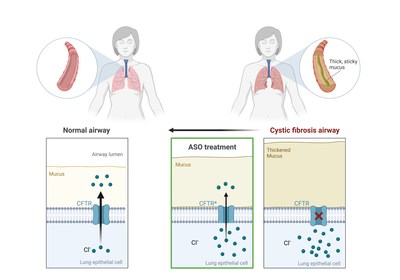A research team at Rosalind Franklin University of Medicine and Science has developed a promising new therapeutic approach for the treatment of cystic fibrosis, a devastating lung and multi-system disease caused by mutations in a gene called CFTR.
| NORTH CHICAGO, Ill., Feb. 8, 2022 /PRNewswire/ -- A research team at Rosalind Franklin University of Medicine and Science has developed a promising new therapeutic approach for the treatment of cystic fibrosis, a devastating lung and multi-system disease caused by mutations in a gene called CFTR. A study led by Professor Michelle Hastings, PhD, and recently published in the Proceedings of the National Academy of Sciences, supports the use of short, RNA-like molecules, called antisense oligonucleotides (ASOs), in combination with approved CF modulators as an effective treatment option for CF patients with class I mutations in the disease-causing gene. The study was funded in part by the Cystic Fibrosis Foundation. “Our ASO treatment resulted in a recovery of CFTR activity in patient cells grown in the lab to simulate the lung environment,” said Dr. Hastings, director of the Center for Genetic Diseases. “The efficacy of the treatment in this cell model of the disease is a good indicator of potential clinical success, giving us hope that our ASO strategy will offer a potential treatment for patients with this particular CF mutation and similar types of mutations as well.” Some people with CF have “stop” mutations that have proven very difficult to treat — in CF and other diseases — because they result in a nearly complete loss of CFTR protein production from the gene. In CF, loss of CFTR causes cell malfunction which affects a number of organs but most severely the lungs, which get clogged with mucus, leading to infections, respiratory failure and other complications. This ASO technology for CF, patented by Dr. Hastings and RFU, is designed to bind to the RNA message, a copy of the gene that is used as a template for protein production. Dr. Hastings’ team, including Professor Robert Bridges, PhD, and post-doctoral fellow Wren Michaels, PhD, developed the RNA-based strategy to help restore CFTR function by directing the cellular machinery to remove the stop mutation during an intermediate stage of production. This type of ASO-based RNA therapeutic has proven to be an effective drug for other diseases. The hope is that this strategy can be developed to treat CF and other diseases caused by stop mutations. Learn more about Rosalind Franklin University, DNA-research pioneer Dr. Rosalind Franklin and read the full press release. Contact:
SOURCE Rosalind Franklin University of Medicine and Science |






